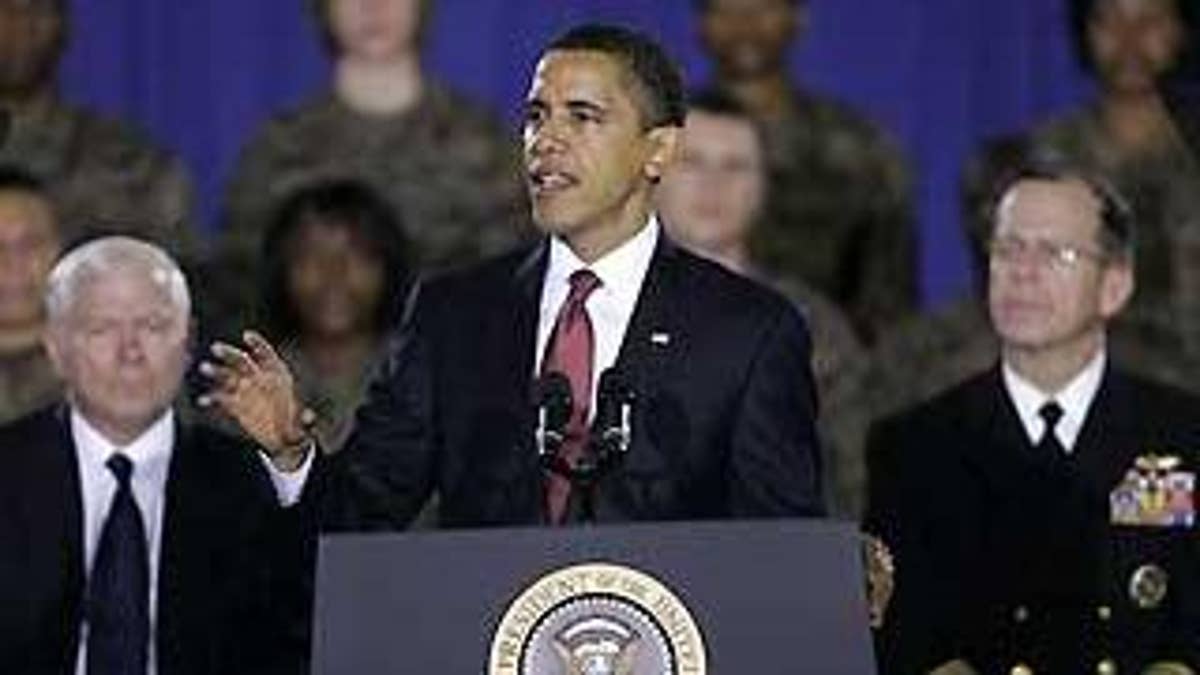
President Obama, declaring there is "renewed cause for hope in Iraq," on Friday announced his plan to end combat operations in Iraq by August of next year.
"Let me say this as plainly as I can. By August 31, 2010, our combat mission in Iraq will end," Obama told Marines at Camp Lejeune, N.C.
Obama said that the situation in Iraq is not yet secure and violence will drag on in the months ahead, but that the goal of a "sovereign, stable and self-reliant" Iraq is achievable in the near future.
Obama, who is preparing to escalate U.S. involvement in Afghanistan, will order the immediate draw-down of the 142,000 Marines and Army personnel in Iraq and wants combat brigades out by Aug. 31 of next year.
Obama said U.S. troops have for six years fought to give Iraqis a chance for a better future, and that, "Now we must ask the Iraqi people to seize it."
Though the president pledged a withdrawal timeline of 16 months during the campaign, his plan would take about 19 months from the day he took office.
The president will also order U.S. military commanders to leave a residual force of between 35,000 and 50,000 troops in Iraq. Under the Status of Forces Agreement with the Iraqi government, the U.S. must remove all military personnel by Dec. 31, 2011.
The move reflects the consensus plan presented to Obama by Defense Secretary Robert Gates; Army Gen. Ray Odierno, the top military commander in Iraq; Army Gen. David Petraeus, head of U.S. Central Command; Adm. Mike Mullen, the chairman of the Joint Chiefs of Staff; and the president's top intelligence officials.
The president will order all U.S. troops to focus their efforts on advising, equipping and training Iraqi security forces as well as assisting in reconstruction and political reconciliation.
"We will complete this transition to Iraqi responsibility, and we will bring our troops home with the honor that they have earned," Obama said Friday.
Obama's decision reflects his belief that "there have been real advances" in the country and, as result, the U.S. military should now be ordered to carry out "a fundamental change in mission," senior administration officials said.
Though the size of the residual force drew criticism from some Democrats, key Republicans, including House Minority Leader John Boehner and former presidential nominee John McCain, voiced support for the president's overall plan.
"Given the gains in Iraq and the requirements to send additional troops to Afghanistan, together with the significant number of troops that will remain in Iraq and the president's willingness to reassess based on conditions on the ground, I am cautiously optimistic that the plan as laid out by the president can lead to success," McCain said.
The president reached his decision after 12 advisory group meetings on Iraq and 10 inter-agency meetings since Inauguration Day. The first Iraq advisory meeting occurred at the White House Jan. 21.
Obama spoke by telephone with Iraqi Prime Minister Nouri Al-Maliki on Friday aboard Air Force One to discuss his plan, according to White House Press Secretary Robert Gibbs, who said Obama also phoned former President George W. Bush "as a courtesy" once he landed.
Obama also made his first official reference Friday to Christopher Hill's appointment as the new ambassador to Iraq, replacing Ryan Crocker. Hill was Bush's chief negotiator with North Korea.
The president decided to order the troop withdrawals on Wednesday. He told lawmakers Thursday the troops remaining in Iraq after Aug. 31, 2010, will carry out new missions and will be trained and organized in a way that de-emphasizes combat-readiness. They will instead focus on training, equipping and advising Iraqi security forces; conducting targeted counter-terrorism missions; and protecting the ongoing civilian and military efforts in Iraq.
To underscore the president's desire to end combat and counter-insurgency missions, officials said after Aug. 31, 2010, there will be no brigade combat teams in Iraq. There are 14 brigade combat teams in Iraq now. The remaining troops will be "reconstituted," officials said, into "advisory and assistance brigades."
Even so, if security conditions in Iraq deteriorate in the coming months the president "retains the flexibility" to slow down or reverse troop withdrawals. Officials said Obama's drawn-down is unlikely to jeopardize security gains achieved as a result of the Bush administration surge that has seen a significant reduction in terrorist-inspired and insurgent-led violence in Iraq.
A portion of the 35,000 to 50,000 remaining troops will be combat-ready and will be ready to deploy in counter-terrorism missions. That means combat operations are still possible, even after Aug. 31, 2010, an official said. Senior officials would not say how large the counter-terrorism force will be, but said it would be well under half the remaining troop strength.
U.S. troops will begin leaving Iraq this spring and the numbers of returning troops will grow during the summer, officials said. A sizable number of troops will remain in Iraq, however, to provide security and training as the country prepares for regional and sub-regional elections this spring and national elections in December.
FOX News' Major Garrett contributed to this report.










































